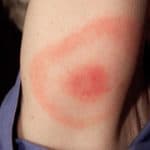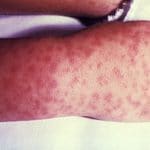Tick Bites
Most tick bites are painless and cause only minor signs and symptoms, like redness, swelling, or a sore on the skin. But some ticks transmit bacteria that cause illnesses, including Lyme disease and Rocky Mountain spotted fever. In general, to transmit Lyme disease a tick needs to be attached for at least 36 hours. Other infections, like Rocky Mountain spotted fever, can be transferred in a few hours or even a few minutes.
Ticks prefer warm, moist areas of the body. Once a tick gets on your body, they are likely to find their way to your armpits, groin, or hair. When they are in their desired spot, they bite into your skin and begin drawing blood. Unlike most other bugs that bite, ticks typically remain attached to your body after they bite you, so if one bites you, you will typically but not always, find it on your skin.
If you are bitten, remove the tick promptly and carefully. Use fine-tipped tweezers to grasp the tick as close to your skin as possible. Gently pull out the tick using a slow and steady upward motion. Avoid twisting or squeezing the tick. Don’t handle the tick with bare hands and don’t use petroleum jelly, fingernail polish, or a hot match to remove a tick. Wash your hands and the bite site using warm water and soap, rubbing alcohol, or an iodine scrub. If possible, seal the tick in a container and take it to your doctor’s appointment because they may want to see the tick.
Most tick bites are harmless but since some ticks can transmit diseases when they bite, be on the lookout for the following symptoms:
- A red spot or rash near the bite site, or a full-body rash
- Neck stiffness
- Fever, chills, fatigue, muscle and joint pain, or headache
- Swollen lymph nodes
- Redness or oozing at the bite site
Rocky Mountain Spotted Fever
Although RMSF cases have been reported throughout most of the contiguous United States, five states (North Carolina, Oklahoma, Arkansas, Tennessee, and Missouri) account for over 60% of RMSF cases. RMSF can be rapidly fatal if not treated within the first 5 days of symptoms. If you have any of the below symptoms, see your doctor immediately, especially if you have recently been in an area that may have ticks. You may not know that you have been bitten by a tick, so it’s better to be safe than sorry!
- Incubation Period of RMSF
- 3–12 days
- Signs and Symptoms
- Fever
- Headache
- Fatigue
- Vomiting
- Muscle pain
- Lack of appetite
- Swelling around the eyes and/or back of hands
- Rash
What can you do to prevent tick bites?
Ticks live in grassy, brushy, or wooded areas, leaf piles, shrubs, or even on animals. Spending time outside walking your dog, camping, gardening, or hunting could bring you in close contact with ticks. Although tick exposure can occur year-round, ticks are most active during warmer months.
Try to avoid wooded and brushy areas with high grass and leaf piles and make sure you walk in the center of trails.
Treat your clothes and gear with 0.5% permethrin.
After being outdoors, make sure you examine your clothes, gear, pets, and yourself! When you check yourself for ticks, be sure to check:
- Under the arms
- In and around the ears
- Inside belly button
- Back of knees
- In and around the hair
- Between the legs
- Around the waistline
If you suspect that you have been bitten by a tick, our Med First teams are ready to help! Don’t delay in seeing one of our providers because time is of the essence! Whether you are a new patient or are an existing patient, you can book an appointment online, call our appointment center or simply walk in! We are accepting new patients at all locations.
We look forward to serving you!

Ticks on boot 
Lesion on patient with Lyme disease 
Late rash in patient with RMSF
https://www.cdc.gov/ticks/tickbornediseases/rmsf.html
https://www.cdc.gov/ticks/gallery/index.html
https://www.cdc.gov/ticks/gallery/index.html#anchor_1592235021091
https://www.epa.gov/insect-repellents/find-repellent-right-you
